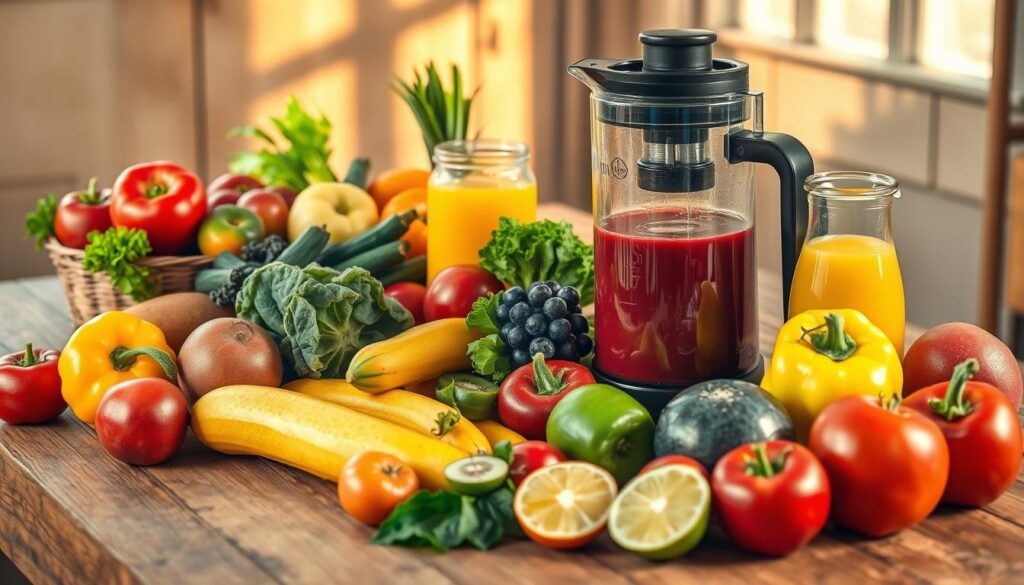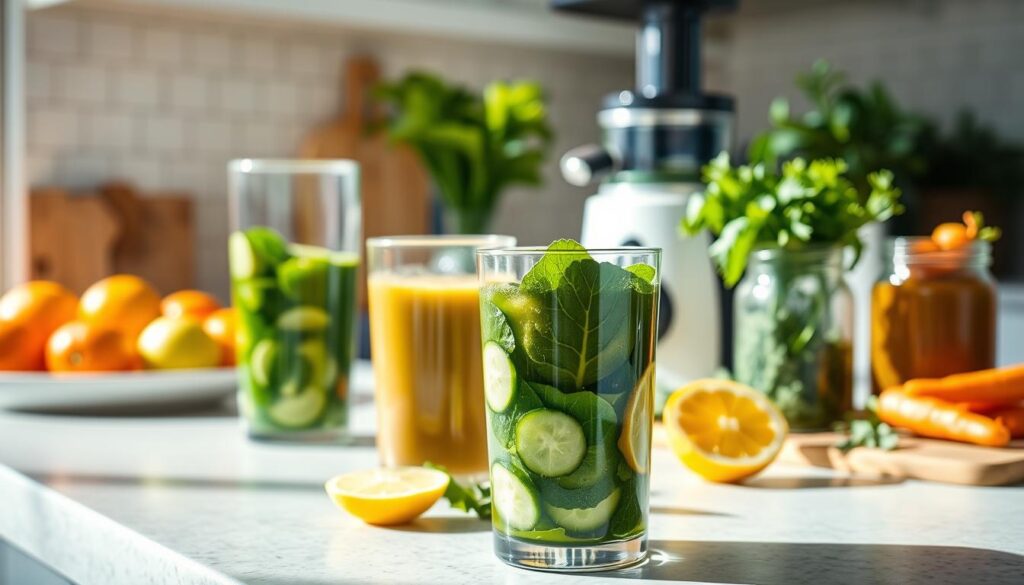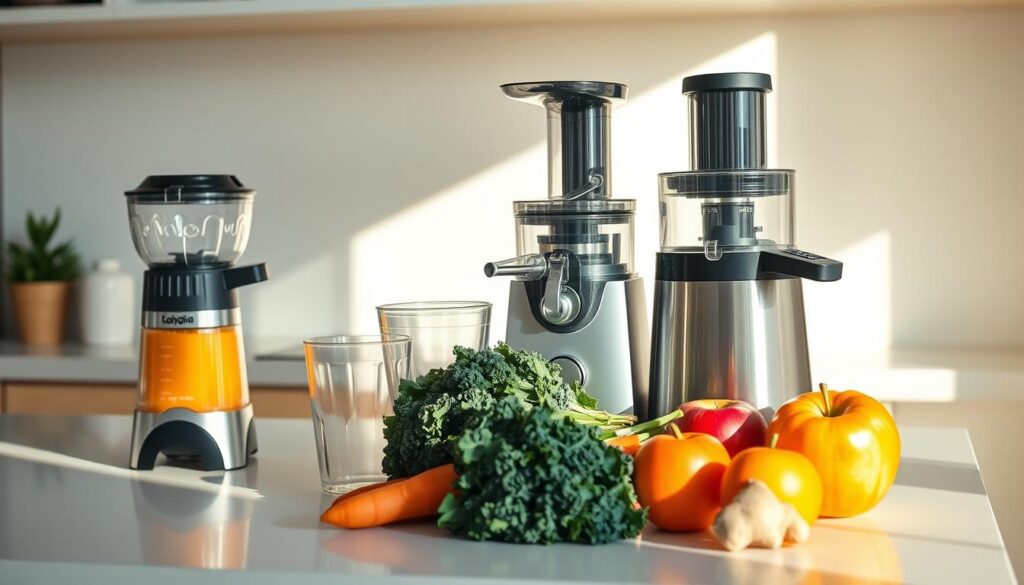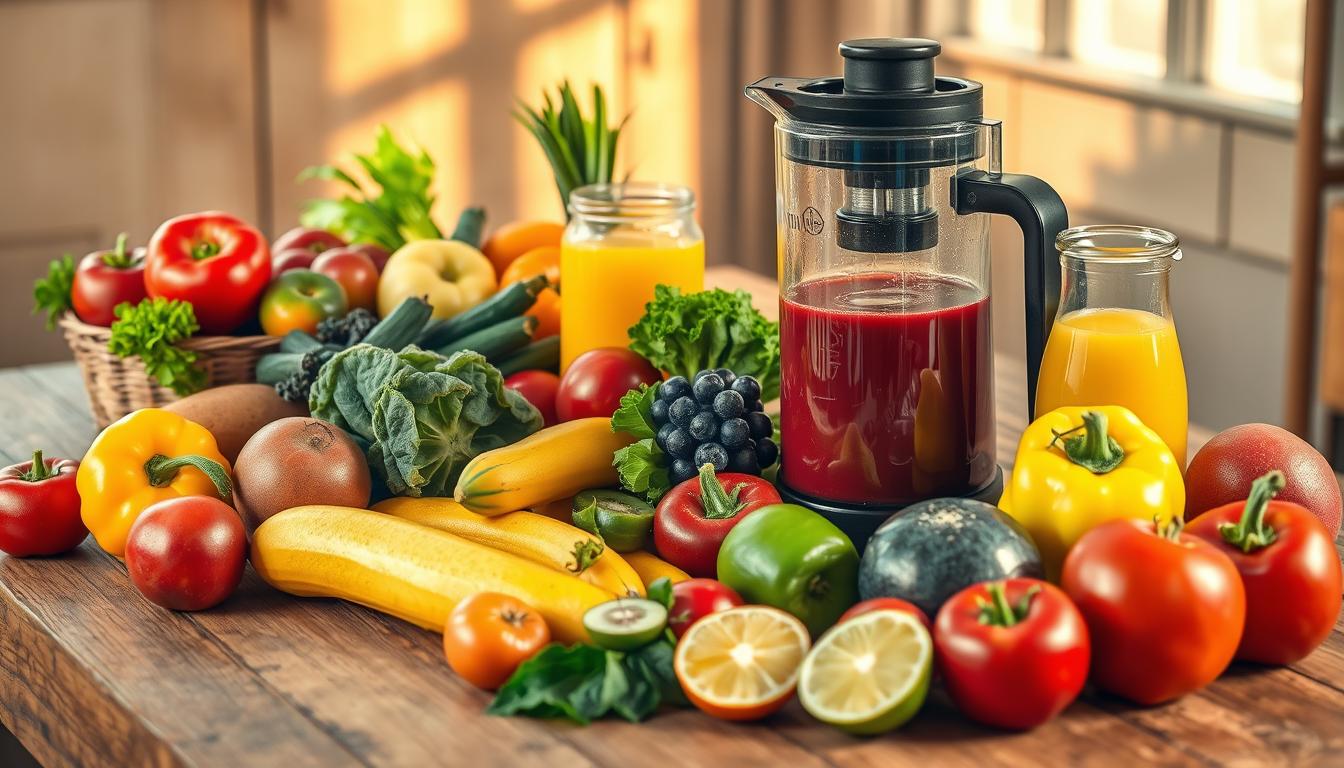
Discovering juicing was like finding a secret weapon for my health. It made managing my weight easier. In the 1990s, juicing started a wellness movement. Now, it’s your chance to use it for your health.
Juicing is more than a trend. It’s a way to get more fruits and veggies into your diet. These easy recipes help you eat less calories and more nutrients. Plus, they make healthy eating fun and tasty.
Imagine drinking a juice that tastes great and helps your body. With the right recipes, you can make drinks that keep you full and energized. They’ll help you stay on track with your weight loss goals.
Key Takeaways
- Juicing provides a convenient way to increase fruit and vegetable intake
- Low-sugar juice recipes can support weight management
- Easy juice recipes can be nutritionally dense and calorie-conscious
- Homemade juices offer more control over ingredients than store-bought options
- Juicing can help you meet recommended daily produce intake
Table of Contents
Understanding the Benefits of Juicing for Weight Loss

Exploring healthy juice recipes can change your weight loss journey. Juicing gives you a rich source of vitamins and minerals. It’s a great way to get the nutrients you need.
How Juicing Supports Weight Management
Juicing can help with weight management if done right. The Dietary Guidelines suggest eating 4 1/2 cups of fruits and veggies a day. Healthy juices can help you reach this goal and might even cut down on calories.
- Provides essential nutrients in a concentrated form
- Helps increase vegetable and fruit consumption
- Can support metabolism with nutrient-rich ingredients
Nutritional Benefits of Fresh Juices
Fresh juices are packed with nutrients. Studies show many benefits:
- A 2020 review in Nutrients shows that eating five servings of produce daily improves mental health
- A 2022 study found drinking vegetable juice can lower blood pressure
- Beets in juice can reduce inflammation and blood sugar levels
Common Misconceptions About Juice Diets
Healthy juices can aid in weight loss, but they’re not a quick fix. Drinking calories can make you hungrier than eating them. Most weight loss from juice cleanses is water, not fat.
Remember: Juicing should complement a balanced diet, not replace entire food groups.
To juice successfully, make sure to get enough protein, healthy fats, and fiber. Your weight loss journey is about making healthy, lasting choices for your health.
Essential Equipment and Preparation Tips

Choosing the right equipment is key to making tasty and healthy juices. You need to know the essential tools and methods for getting the most juice and nutrients.
When starting with juicing, consider these important equipment options:
- Cold Press Juicers: Great for keeping nutrients intact
- Centrifugal Juicers: Fast and good for beginners
- Blenders: A good choice for smoothie juices
The Nama J2 Cold Press Juicer is a top pick for juice lovers. It extracts juice well and comes with a 10% discount code (BOV10) for home users.
Getting ready for juicing is just as important as the equipment. Here are some must-do tips:
- Wash all produce well
- Cut ingredients into easy-to-handle pieces
- Take out seeds and hard stems
- Stick to the 80-20 rule: 80% veggies, 20% fruits
When making your best juicer juice recipes, aim for 600-800 mL of juice per batch. This makes about four 16 oz servings. You can keep these in the fridge for up to 3 days in a sealed container.
Pro tip: Pick your ingredients wisely. Celery is low in sugar, and spinach is packed with vitamins and minerals. Cucumbers add extra water to your juice.
Remember, the quality of your juice depends on both your equipment and ingredient selection.
Best Fruits and Vegetables for Weight Loss Juicing
Making easy juice recipes for weight loss means picking the right ingredients. Your juice can be a strong ally in your diet when you choose wisely. Look for fruits with less sugar and vegetables packed with nutrients.
It’s key to know which fruits and veggies help with weight loss. Not all are created equal in nutritional value.
Low-Sugar Fruit Options
Some fruits are great for making tasty, low-calorie juices:
- Berries (strawberries, blueberries)
- Green apples
- Grapefruit
- Kiwi
- Lemons
These fruits have fewer calories and sugar, making them perfect for weight loss juices. For example, a kiwi agua fresca has only 43 calories per serving.
Nutrient-Dense Vegetables
Vegetables are the hidden gem in your juices. They offer lots of nutrition with few calories:
- Celery (65 calories per serving)
- Tomatoes (46 calories per serving)
- Cucumber
- Bell peppers
Power-Packed Greens
Green veggies are a big plus for weight loss juices:
- Kale
- Spinach
- Broccoli
- Swiss chard
Pro tip: Add herbs like parsley or cilantro to boost flavor without adding sugar. These greens help make juices that are full of nutrients and support your weight loss.
Easy Juice Recipes for Beginners
Starting your juicing journey can feel overwhelming. But, these nice juice recipes will help you feel more confident in the kitchen. Only 9% of US adults eat enough veggies, so juicing is a great way to get more nutrients.
Beginners, don’t worry! We’ve picked simple recipes that are both healthy and yummy. Start with ingredients you know and then try new flavors.
Green Beginner’s Juice
- 2 green apples
- 4 cups spinach
- 1-inch piece of ginger
- Half a lemon
Juicing tip: Use 80% veggies and 20% fruits to keep your blood sugar stable. This green juice follows that rule well.
Carrot Ginger Energizer
- 4 large carrots
- 1-inch fresh ginger root
- 1 small orange
This juice has about 91 calories per serving and gives you a nice energy boost. The mix of carrots and ginger is spicy-sweet and great for beginners.
Pro tip: Invest in a quality juicer like the Hurom H400 Easy Clean Slow Juicer for the best results in your juicing adventure.
Remember, juicing is about enjoying the journey and finding flavors you like. Start simple, be patient, and have fun with these easy recipes!
Green Detox Juice Combinations
Green juice recipes are great for losing weight and detoxing. They pack a lot of vitamins and minerals into one glass. These juices help remove toxins, boost your metabolism, and aid in weight loss.
Green juices are more than a trend. They’re a smart way to eat that can reset your body and help you reach your wellness goals. By choosing low-sugar, vegetable-rich juices, you get nutrition without extra calories.
Classic Green Juice Recipe
This basic green juice recipe is packed with nutrients. Here’s what you need:
- 8 celery stalks
- 1 English cucumber
- 1 bunch flat-leaf parsley
- 3 kale leaves
- 1 green apple
- 1 lime (skin removed)
Spinach and Apple Blend
This easy-to-make juice is perfect for beginners. It’s full of iron and minerals from spinach and sweet from the apple.
Kale Power Juice
Kale is a nutritional superstar in juices. This recipe boosts your nutrient intake and helps with weight loss.
| Juice Type | Calories | Sugar Content |
|---|---|---|
| Green Vegetable Juice | 42 | 7.2g |
| Lemon and Ginger Green Juice | 63 | 5.5g |
| Celery Juice | 65 | 3.8g |
Pro tip: Drink your juice right away for the most vitamins. Store it in a jar for up to 4 days in the fridge, but fresh is always best.
Metabolism-Boosting Juice Recipes
Boosting your metabolism can be tasty with the right juices. Some ingredients naturally help your body burn more calories. Knowing which ones to use can change how you juice.
For juices that boost metabolism, pick ingredients that help with weight loss. Some of the best include:
- Ginger: It helps increase calorie burn.
- Green tea: It’s full of antioxidants that boost metabolism.
- Citrus fruits: They’re rich in vitamin C and help with fat metabolism.
- Cayenne pepper: It speeds up metabolism.
Here are two quick juice recipes to try:
- Ginger Zinger: Mix green apple, ginger, lemon, and cucumber.
- Metabolism Boost Blast: Combine kale, pineapple, green apple, and a bit of cayenne.
These juices are low in calories but full of nutrients. The Ginger Zinger has about 120 calories. The Metabolism Boost Blast has around 150 calories. They work best with a healthy diet and exercise.
Pro tip: Drink your metabolism-boosting juice in the morning to kickstart your metabolic rate for the day.
Start your metabolism journey with smart ingredients and regular juicing. Try different mixes to find your favorite flavors and support your weight loss goals.
Low-Calorie Fruit and Vegetable Blends
Exploring a nice juice recipe for weight loss can be fun and tasty. Low-calorie fruit and vegetable blends are great for nourishing your body without too many calories. These vibrant juices give you important nutrients while helping you reach your health goals.
When making your juice, pick ingredients that are full of nutrients but low in calories. Here are some tips for making the best low-calorie juice:
- Choose water-rich vegetables like cucumber and celery
- Select fruits with lower sugar content
- Incorporate leafy greens for nutrient density
- Use herbs and spices to boost flavor without calories
Berry and Beet Juice
This blend mixes berries’ antioxidants with beets’ metabolism boost. A typical serving has about 153 calories, making it great for those watching their weight. Its bright red color means it’s packed with nutrients for your health.
Citrus Energy Boost
Start your day with a zesty citrus juice to boost your metabolism. Grapefruit and lemon make a refreshing juice with about 127 calories per serving. The citrus oils can also help with digestion and give you a natural energy boost.
Watermelon Refresher
Try a watermelon-based juice for a hydrating and low-calorie choice. With just 107 calories per serving, it’s a sweet treat that supports weight loss. Watermelon is full of hydration and nutrients that help reduce inflammation and support metabolism.
Pro tip: Always use fresh, organic produce to maximize nutritional benefits and minimize pesticide exposure.
Making Your Juices More Filling
Making healthy juice recipes that fill you up is important for weight loss. Juices are full of nutrients but might not keep you full for long. To fix this, make your juices more filling.
Make your juices more substantial by adding fiber-rich ingredients. These keep you full for longer. Here are some tips to make your juices more nutritious and filling:
- Add chia seeds for extra fiber and protein
- Incorporate juice pulp back into your drink
- Blend in a small amount of healthy fat like almond butter
- Use vegetables with higher fiber content
Fiber is key to making juices more satisfying. It slows down digestion, keeps blood sugar stable, and controls hunger. This way, your juices help you reach your weight loss goals better.
| Ingredient | Fiber Content | Fullness Factor |
|---|---|---|
| Chia Seeds | 10.6g per ounce | High |
| Kale | 2.6g per cup | Medium |
| Apple Pulp | 1.5g per half cup | Low-Medium |
Try these methods to make juices that are not only delicious but also keep you full and energized all day.
Storage and Preparation Tips for Juice Making
Learning how to store your juicing recipes is key to keeping them fresh and full of nutrients. Fresh juices are very delicate. They need careful handling to keep their nutrients and taste.
Here are some important storage tips:
- Use airtight glass containers for storage
- Refrigerate immediately after juicing
- Consume within 24-48 hours for optimal nutritional value
- Fill containers to the brim to minimize oxygen exposure
Pro tip: Add a squeeze of lemon to slow down oxidation and keep it fresh longer. Cold-press juices can last up to 72 hours if stored right between 35-40°F.
Being prepared is important for making juice efficiently. Here are some tips:
- Wash produce thoroughly before juicing
- Chop larger fruits and vegetables into 2-inch cubes
- Prep ingredients in advance
- Use seasonal, fresh produce for best results
By following these storage and preparation tips, you’ll get the most out of your homemade juices. You’ll also make the process easier and more fun.
Conclusion
Starting a weight loss journey with easy juice recipes can change how you view health. You’ll learn that juicing is more than just dieting. It’s a way to add delicious, nutritious drinks to your daily routine.
For lasting weight management, balance is key. Juicing is great for nutrition, but it’s best with exercise and a balanced diet. Start with small amounts of juice, like 2-4 ounces, and slowly increase it as you get used to it.
Choosing to try these juicing recipes can lead to big health changes. Use organic fruits and veggies, get a good juicer, and try vegetable juices for weight loss. Enjoy the journey, one glass at a time.
Now you know how to use juicing for weight loss. Your health journey is unique, and these juicing tips can make it tasty and exciting. Start making healthy choices today.


2 thoughts on “Easy juice recipes for weight loss”